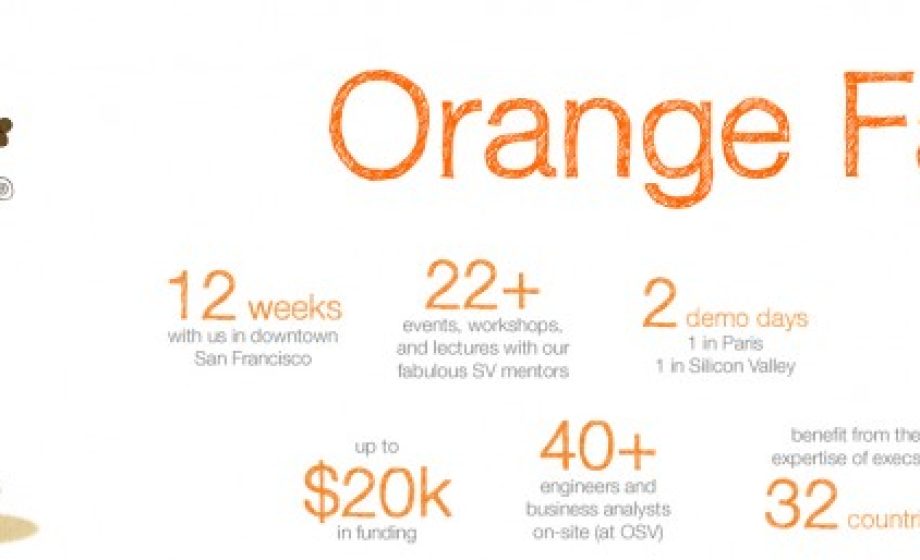
Orange CEO Stephane Richard flew from Paris to San Francisco on Monday 13th, to kick off the first class of Orange Fab, the startup accelerator launched in March by the European telecom giant.
The 3 months program, as we reported last month, “supports U.S.-based start-ups with an existing product which changes the way people connect”, and just officially unveiled its 6 selected participants.
At the kickoff party, Stephane Richard insisted on Orange’s strong ties with Silicon Valley – he had lunch with Tim Cook on Monday, and was going to meet with other Silicon Valley execs. “I try to come at least once a year in Silicon Valley (…) there is always something new, something to learn (…) in a big organization like Orange, speed is a very important thing obviously, and it’s quite challenging when you’re a large organization, processes can be long and heavy.” It isn’t so common for French companies to admit that they can learn from Silicon Valley, so it will be interesting to see what Orange does with this accelerator. Richard explained, “it’s a part of our innovation approach, we want to simplify our relationship between us and the innovators, and provide them with direct access with the executive team of the company.” He also revealed that they were thinking of launching a French version if the experiment goes well. “I pay a lot of attention to what you do here [George Nahon], because clearly in our industry we need to have a very strong link to what’s happening in the Valley, it is the heart of our industry that beats”. Again, it’s worth noting that big companies in France have yet to adopt Silicon Valley’s methods and embrace startup culture, so this is an interesting move and will be worth observing over the next few months.
The 6 selected startups then each gave a 5 minute pitch. The list includes AlephCloud (Content Control and Privacy for the Cloud), Fenix international (Power for 600M off-grid mobile customers), Phone Halo (cloud-based tracking for items), Re:Char (mobile data collection and cloud analytics for Kenyan farmers), Talkdesk (call center software for small businesses), Virtrue (online identity verification service).
Rude Baguette interviewed two of them, both of which captured the attention of the crowd, because of their global ambition to tackle some of today’s biggest issues.
Fenix was started in 2009 by two ex- Apple employees, Mike Lin and Brian Warshawsky, to provide tools to small entrepreneurs around the world with no power access, mostly ways to charge phones and computers. They launched a Kickstarter campaign to test the US market back in July 2012, and reached their goal of 20K in just one day, then went on to raise $112,000. Their hardware product Fenix ReadySet is, to quote the company, “an intelligent plug-and-play energy system that can power mobile phones, lights, water purifiers and even medical applications.” The device can be charged “from a portfolio of energy sources including solar, micro-wind, micro-hydro, and even a bicycle dynamo.” They design the product in California, manufacture the hardware in China and ship it directly to Africa where their clientele is based. It’s Orange’s distribution network, especially in Africa, that attracted them. “Orange has such a strong brand and distribution, our goal is to partner with them to enter new markets (…) even though we’re delivering energy – like solar panels and this ReadySet battery system – it’s the same distribution channel as they use to distribute cellphones.”
Their goal is also to create a “power API” that anybody could tap into: “the ReadySet is mostly an open platform, with your iPhone you have the usb cable, you plug it into the Readyset, (…) so everything is open source and you can power just about anything (…) we now published specifications to get companies who will hopefully develop apps for this, like this San Francisco based company called Instructable”.
Another team, Re:Char, seeks to empower farmers in East Africa thanks to hardware. Re-Char founders Jason Aramburu and Luke Iseman have a background in soil engineering and manufacturing, and decided to build Soil IQ, a sensor device to collect data from farmer’s soils. They have been working for the past two years in Kenya on soil fertility, and with Orange “saw the opportunity to make it a consumer product through mobile phones.” The problem they identified, is that farmers don’t know anything about their lands and what they can use to make the most of it. Also, “there isn’t really distribution channels, even traditional fertilizers have very little penetration in Africa,” Luke explains, “let alone newer things like compost – it’s just a lack of infrastructure in general.” The sensor device’s target price is “under $20”, and they plan on partnering with carriers to perhaps be included as part of the phone lease or purchase. “Our biggest barrier has been distribution, so Orange has that largely figured out. We think we can be one of the 10 reasons people switch from dumb phones to smartphones.”
The opportunity for vendors is big. “The market is hugely fragmented,” Jason explains, “most of these farmers buy seeds and fertilizers and it has changed hands ten times, because big companies don’t have the reach in Africa, they don’t even have the addresses of these farmers, it’s a huge unmet need right there.” The data generated through the sensor technology is extremely valuable. “Governments spend millons of dollars to map soils, and we can do it at a much lower cost, and then own that data (…) also you couldn’t have a product delivered to someone’s farm right now, but we could.” On the other hand, the opportunity to change the farmers’ lives about “things like plant diseases [which] can be mapped out”, would allow farmers to get invaluable information on the lands they are working on. The team plans to sell 1000 devices this year.
All 6 startups in the Orange Fab accelerator will pitch in Paris in June, and Silicon Valley in August.

